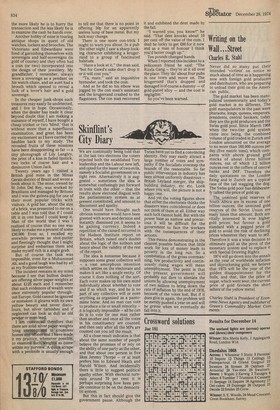Skinflint's City Diary
We are continually being told that at the last two elections the voters rejected both the established Tory leadership and the Labour new left, and opted for the lesser of two evils, namely a Socialist government on a tight rein. Alternatively it is suggested — sometimes the idea is somewhat confusingly put forward in train with the other — that the results show electoral disgust with the parliamentary system as at present constituted, and amount to discontent and apathy.
One would have thought such obvious nonsense would have been greeted with scorn and derision and instantly dismissed yet it seems to be gaining currency. Indeed a repetition of the canard occurred in the Hudson Institute report on Britain, which raised one's doubts about the logic of the authors and hence about the validity of the rest of the report.
The idea is nonsense because it supposes some great collective will — a vast amorphous intention which settles on the electorate and makes it act like a single entity. Of course it does nothing of the sort. Each voter makes up his own mind individually about whether to vote and if so which way, and he is no part of any collective will or even anything as organised as a pantomime horse. And no man can vote to produce a tie or small minority — it is logically impossible — all he can do is to vote for one man rather then another and once all the votes in his constituency are counted, and then only after all the MPs are counted can you tell the result.
All a close result indicates is that about the same number of people believe the promises of or rely on the ability of one party as the other, and that about one person in five likes Jeremy Thorpe — or at least prefers him to Edward Heath and Harold Wilson. And incidentally there is little to suggest political apathy either. With electoral turnouts around 70 per cent it is perhaps surprising how keen people continue to be on the democratic system.
But this in fact should give the government pause. Although the Tories have yet to find a convincing identity, they may easily attract a large number of votes and sympathy if the Socialists overstep the bounds of the reasonable. So far public intervention in industry has been almost uniformly disastrous — British Leyland merger, the shipbuilding industry, etc etc. Look where you will, the picture is not a happy one And yet the voting figures show that either the electorate thinks the disasters were coincidental or does not think of them at all. Either way such luck cannot hold. But with the power base so narrow and precarious it will be difficult for the government to face the workers with the consequences of their actions.
This means demonstrating in the clearest possible fashion that little work for lots of money leads to poverty in the long run. So a combination of the gross overmanning, low productivity and continuously rising wages will mean unemployment. The point is that the present government will -probably not dare to alienate the unions by allowing unemployment of two million to bring down the rate of inflation by the end of 1976, because of the votes lost. But if it does give in again, the problem will be merely pushed a year on and will be graver when we eventually do fall into it.














































 Previous page
Previous page